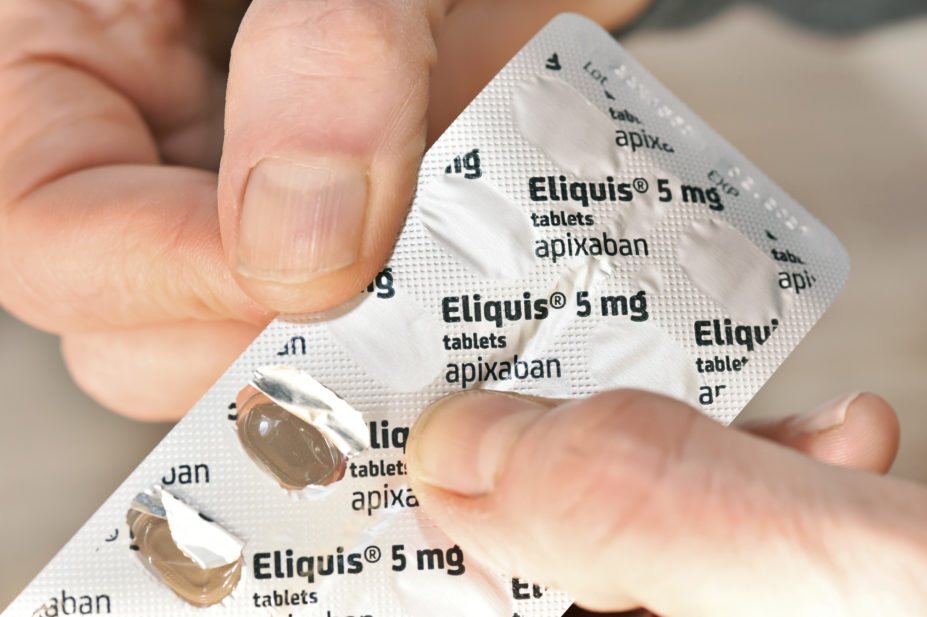
DR P. MARAZZI / SCIENCE PHOTO LIBRARY
NHS England has said that 20,000 strokes and 5,000 deaths could be avoided as a result of plans to scale up the use of direct oral anticoagulants (DOACs) over the next three years.
In an announcement on 16 November 2021, Amanda Pritchard, chief executive of NHS England, said the NHS had struck a deal with three manufacturers to make DOACs more affordable, allowing local NHS systems to provide them to 610,000 additional patients with atrial fibrillation (AF) in England.
The announcement follows the publication of updated guidance from the National Institute for Health and Care Excellence (NICE), which recommends four DOACs — apixaban, dabigatran, edoxaban and rivaroxaban — as options for people with AF and a CHA2DS2‑VASc score of 2 or above for the prevention of stroke.
After the NICE guidance was published, NHS England said it initiated a national procurement deal on DOACs to make access more affordable and save money for both the NHS and the taxpayer from the reduction in strokes.
NHS England confirmed to The Pharmaceutical Journal that it had signed agreements with manufacturers Daiichi Sankyo, Bayer and Bristol Myers Squibb (BMS) — on behalf of the BMS/Pfizer alliance — covering apixaban, edoxaban and rivaroxaban.
It added that, while Boehringer Ingelheim — which makes dabigatran — is not party to the frameworks, its DOAC will remain an available option for NHS clinicians to provide.
In its statement on 16 November 2021, NHS England said that expanding the use of DOACs to 610,000 patients “will help to prevent an estimated 21,700 stokes and save the lives of 5,400 patients from a fatal outcome over the next three years”.
It added that treating AF with a DOAC will require patients to see their GP, or visit a hospital for monitoring, less frequently.
Helen Williams, consultant pharmacist for cardiovascular disease (CVD) at South East London Clinical Commissioning Group and national specialty adviser for CVD prevention at NHS England, described the new agreement as “good news” for the 1.5 million AF patients in England.
“Not only is stroke one of the biggest killers in our country, but it leads to life-changing and often devastating long-term harm for many others, so by ensuring these drugs are made available for all people with AF who are at risk of stroke, the NHS will not only prevent serious harm to the people affected but avoid the need for aftercare, which puts additional pressure on the health service,” she said.
“Tackling heart disease and stroke is a top priority in the ‘NHS long term plan’, which will save thousands of lives by better diagnosis and treatment for people with killer conditions.”
Paul Wright, lead cardiac pharmacist for Barts Heart Centre at Barts Health NHS Trust, said the announcement was “certainly good news”: “There has been much work across the UK to improve optimisation of anticoagulation for individuals identified as having AF. The technology mentioned aimed at improving diagnosis is also exciting news as once identified, appropriate anticoagulation can be discussed and initiated where appropriate.
“Much work has already been done to optimise anticoagulation use in those with AF known to be high risk of stroke – this news will facilitate achieving the suggested target of anticoagulation in 90% of those considered at high risk.”
In the ‘NHS long term plan’, published in January 2019, NHS England committed to preventing up to 150,000 heart attacks, strokes, and dementia cases over the following ten years.
Pritchard added that the NHS “now has a proven track record of striking deals with manufacturers to ensure patients in England get cutting-edge care at a price which offers best value for taxpayers”.
Read more: How pharmacists have taken over the care of venous thromboembolism patients in our area


